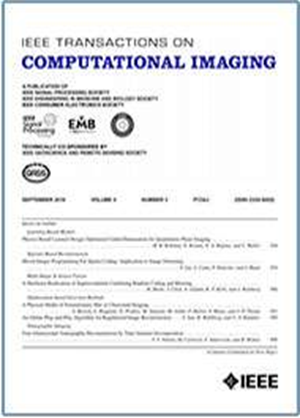Fast Adaptive Plug-and-Play ADMM Framework for Short-Range 3-D SAR Imaging
IF 4.8
2区 计算机科学
Q2 ENGINEERING, ELECTRICAL & ELECTRONIC
引用次数: 0
Abstract
The advancement of short-range millimeter-wave (MMW) synthetic aperture radar (SAR) imaging has shown significant advancements in various fields, including security surveillance, non-destructive evaluation, and medical diagnostics. This paper presents a fast adaptive plug-and-play alternating direction method of multipliers (FA-PnP-ADMM) framework designed to improve the efficiency and accuracy of SAR image reconstruction. By addressing key challenges like image degradation caused by fast Fourier transform (FFT) operations and the computational burden of conventional ADMM methods, our framework significantly improves performance. Concretely, alongside a PnP strategy, the proposed FA-PnP-ADMM framework leverages the state-of-the-art single-frequency holographic (SFH) ADMM-based image-solving model and the adaptive parameter adjustment predicated on the relationship between relaxed ADMM and relaxed Douglas-Rachford splitting (DRS). This innovative integration significantly accelerates convergence and reduces computational overhead. Furthermore, the methodology incorporates proficient denoising deep learning (DL) architectures, encompassing convolutional neural network (CNN) and auto-encoder (AE), seamlessly embedded within the iterative process, resulting in a tailored PnP-DL-ADMM. This synergy not only enhances noise suppression and image fidelity but also adapts effectively to diverse scene complexities and noise levels. Unlike previous works that employ these techniques separately, our approach integrates adaptive optimization and DL-based denoisers into a unified framework optimized for short-range 3D SAR imaging. Experimental results demonstrate substantial improvements in both runtime and reconstruction quality, highlighting the practicality and impact of this methodology for real-world applications.用于近距离三维SAR成像的快速自适应即插即用ADMM框架
近距离毫米波(MMW)合成孔径雷达(SAR)成像的进步在安全监控、无损评估和医疗诊断等各个领域取得了重大进展。为了提高SAR图像重建的效率和精度,提出了一种快速自适应即插即用交替方向乘法器(FA-PnP-ADMM)框架。通过解决快速傅里叶变换(FFT)操作引起的图像退化和传统ADMM方法的计算负担等关键挑战,我们的框架显着提高了性能。具体而言,除了PnP策略外,所提出的FA-PnP-ADMM框架还利用了最先进的基于单频全息(SFH) ADMM的图像求解模型以及基于松弛ADMM和松弛Douglas-Rachford分裂(DRS)之间关系的自适应参数调整。这种创新的集成显著地加速了收敛并减少了计算开销。此外,该方法结合了熟练的去噪深度学习(DL)架构,包括卷积神经网络(CNN)和自动编码器(AE),无缝嵌入到迭代过程中,从而产生定制的PnP-DL-ADMM。这种协同作用不仅增强了噪声抑制和图像保真度,而且有效地适应了不同场景的复杂性和噪声水平。与之前单独使用这些技术的工作不同,我们的方法将自适应优化和基于dl的去噪器集成到一个统一的框架中,针对短程3D SAR成像进行了优化。实验结果表明,在运行时间和重建质量方面都有了实质性的改进,突出了该方法在实际应用中的实用性和影响。
本文章由计算机程序翻译,如有差异,请以英文原文为准。
求助全文
约1分钟内获得全文
求助全文
来源期刊

IEEE Transactions on Computational Imaging
Mathematics-Computational Mathematics
CiteScore
8.20
自引率
7.40%
发文量
59
期刊介绍:
The IEEE Transactions on Computational Imaging will publish articles where computation plays an integral role in the image formation process. Papers will cover all areas of computational imaging ranging from fundamental theoretical methods to the latest innovative computational imaging system designs. Topics of interest will include advanced algorithms and mathematical techniques, model-based data inversion, methods for image and signal recovery from sparse and incomplete data, techniques for non-traditional sensing of image data, methods for dynamic information acquisition and extraction from imaging sensors, software and hardware for efficient computation in imaging systems, and highly novel imaging system design.
 求助内容:
求助内容: 应助结果提醒方式:
应助结果提醒方式:


